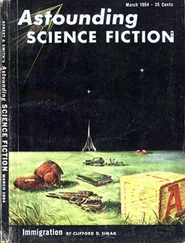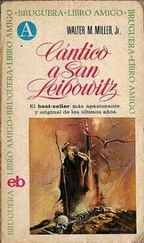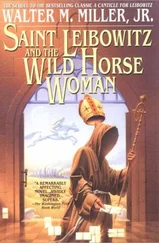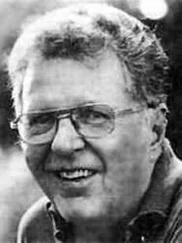“Impurity, once.”
“Thought, word, or deed?”
“Well, there was this succubus, and she—”
“Succubus? Oh — nocturnal. You were asleep?”
“Yes, but—”
“Then why confess it?”
“Because afterwards.”
“Afterwards what? When you woke up?”
“Yes. I kept thinking about her. Kept imagining it all over again.”
“All right, concupiscent thought, deliberately entertained. You’re sorry? Now, what next?”
All this was the usual sort of thing that one kept hearing time after endless time from postulant after postulant, novice after novice, and it seemed to Father Cheroki that the least Brother Francis could do would be to bark out his self-accusations one, two, three, in a neat orderly manner, without all this prodding and prompting. Francis seemed to find difficulty in formulating whatever he was about to say; the priest waited.
“I think my vocation has come to me, Father, but—” Francis moistened his cracked lips and stared at a bug on a rock.
“Oh, has it?” Cheroki’s voice was toneless
“Yes, I think — but would it be a sin, Father, if when I first got it, I thought rather scornfully of the handwriting? I mean?”
Cheroki blinked. Handwriting? Vocation? What kind of a question was — He studied the novice’s serious expression for a few seconds, then frowned.
“Have you and Brother Alfred been passing notes to each other?” he asked ominously.
“Oh, no, Father!”
“Then whose handwriting are you talking about?”
“The Blessed Leibowitz.”
Cheroki paused to think. Did there, or did there not, exist in the abbey’s collection of ancient documents, any manuscript penned personally by the founder of the Order? — an original copy? After a moment’s reflection, he decided in the affirmative; yes, there were a few scraps of it left, carefully kept under lock and key.
“Are you talking about something that happened back at the abbey? Before you came out here?”
“No, Father. It happened right over there—” He nodded toward the left. “Three mounds over, near the tall cactus.”
“Involving your vocation, you say?”
“Y-yes, but—”
“Of course,” Cheroki said sharply, “you could NOT POSSIBLY be trying to say that — you have received — from the Blessed Leibowitz, dead now, lo, the last six hundred years — a handwritten invitation to profess your solemn vows? And you, uh, deplored his handwriting? — Forgive me, but that’s the impression I was getting.”
“Well, it’s something like that, Father.”
Cberoki sputtered. Becoming alarmed, Brother Francis produced a scrap of paper from his sleeve and handed it to the priest. It was brittle with age and stained. The ink was faded.
“Pound pastrami,” Father Cheroki pronounced, slurring over some of the unfamiliar words, “can kraut, six bagels — bring home for Emma.” He stared fixedly at Brother Francis for several seconds “This was written by whom?”
Francis told him.
Cheroki thought it over. “It’s not possible for you to make a good confession while you’re in this condition. And it wouldn’t be proper for me to absolve you when you’re not in your right mind.” Seeing Francis wince, the priest touched him reassuringly on the shoulder. “Don’t worry, son, we’ll talk it over after you’re better. I’ll hear your confession then. For the present—” He glanced nervously at the vessel containing the Eucharist. “I want you to gather up your things and return to the abbey at once.”
“But, Father, I—”
“I command you,” the priest said tonelessly, “to return to the abbey at once.”
“Y-yes, Father.”
“Now, I’m not going to absolve you, but you might make good act of contrition and offer two decades of the rosary as penance anyhow. Would you like my blessing?”
The novice nodded, fighting tears. The priest blessed him arose, genuflected before the Sacrament, recovered the golden vessel, and reattached it to the chain around his neck. Having pocketed the candle, collapsed the table, and strapped it in place behind the saddle, he gave Francis a last solemn nod, then mounted and rode away on his mare to complete his circuit of the Lenten hermitages. Francis sat in the hot sand and wept.
It would have been simple if he could have taken the priest to the crypt to show him the ancient room, if he could have displayed the box and all its contents, and the mark the pilgrim had made on the rock. But the priest was carrying the Eucharist, and could not have been induced to climb down into a rock-filled basement on his hands and knees, or to paw though the contents of the old box and enter into archaeological discussions; Francis had known better than to ask. Cheroki’s visit was necessarily solemn, as long as the locket he was wearing contained a single Host; although, alter it was empty, he might be amenable to some informal listening. The novice could not blame Father Cheroki for leaping to the conclusion that he had gone out of his mind. He was a little groggy from the sun, and he had stammered quite a bit. More than one novice had turned up with addled wits after a vocational vigil.
There was nothing to do but obey the command to return.
He walked to the shelter and glanced into it once again, to reassure himself that it was really there; then he went to get the box. By the time he had it repacked and was ready to leave, the dust plume had appeared in the southeast, heralding the arrival of the supply carrier with water and corn from the abbey. Brother Francis decided to wait for his supplies before starting the long trek home.
Three donkeys and one monk ambled into view at the head of the dust streamer. The lead donkey plodded under the weight of Brother Fingo. In spite of the hood, Francis recognized the cook’s helper from his hunched shoulders and from the long hairy shins that dangled on either side of the donkey so that Brother Fingo’s sandals nearly dragged the ground. The animals that followed came loaded with small bags of corn and skins of water.
“Sooooee pig-pig-pig! Sooee pig!” Fingo called, cupping his hands to his mouth and broadcasting the hog-call across the ruins as if he had not seen Francis waiting for him beside the trail. “Pig pig pig! — Oh, there you are, Francisco! I mistook you for a bone pile. Well, we’ll have to fatten you up for the wolves. There you are, help yourself to the Sunday slops. How goes the hermit trade? Think you’ll make it a career? Just one waterskin, mind you, and one sack of corn. And watch Malicia’s hind feet; she’s in rut and feels frolicky — kicked Alfred back there, crunch! right in the kneecap. Careful with it!” Brother Fingo brushed back his hood and chortled while the novice and Malicia fenced for position. Fingo was undoubtedly the ugliest man alive, and when he laughed, the vast display of pink gums and huge teeth of assorted colors added little in his charm; he was a sport, but the sport could scarcely be called monstrous; it was a rather common hereditary pattern in the Minnesota country from whence he came; it produced baldness and a very uneven distribution of melanin, so that the gangling monk’s hide was a patchwork of beef-liver and chocolate splashes on an albino background. However, his perpetual good humor so compensated for his appearance that one ceased to notice it after a few minutes; and after long acquaintance, Brother Fingo’s markings seemed as normal as those of a painted pony. What might have seemed hideous if he were a sulking fellow, managed almost to become as decorative as clown’s make-up when accompanied by exuberant good cheer. Fingo’s assignment to the kitchen was punitive and probably temporary. He was a woodcarver by trade, and normally worked in the carpenter’s shop. But some incident of self-assertion, in connection with a figure of the Blessed Leibowitz which he had been permitted to carve, had caused the abbot to order him transferred to the kitchen until he showed some signs of practicing humility. Meanwhile, the figure of the Beatus waited in the carpentry shop, half-carved.
Читать дальше








